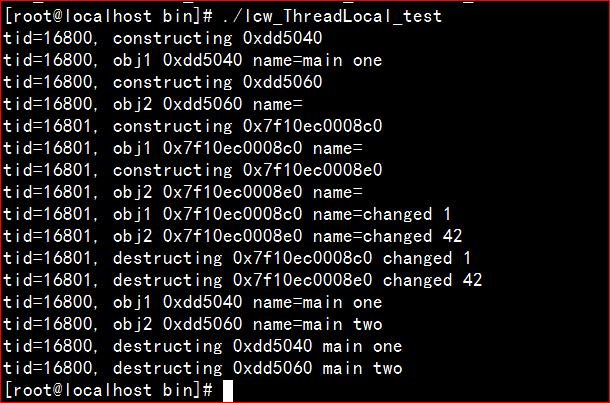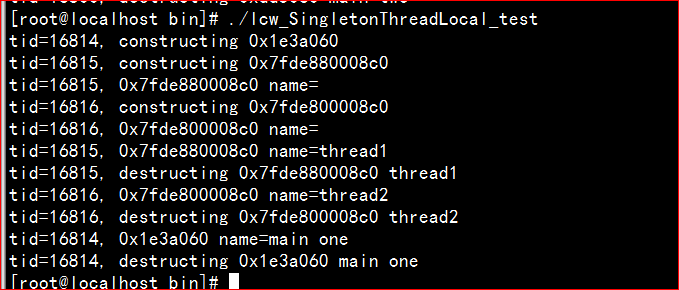muduo网络库源码学习————线程特定数据
muduo库线程特定数据源码文件为ThreadLocal.h
//线程本地存储
// Use of this source code is governed by a BSD-style license
// that can be found in the License file.
//
// Author: Shuo Chen (chenshuo at chenshuo dot com)
#ifndef MUDUO_BASE_THREADLOCAL_H
#define MUDUO_BASE_THREADLOCAL_H
#include <boost/noncopyable.hpp>
#include <pthread.h>
namespace muduo
{
template<typename T>
class ThreadLocal : boost::noncopyable//不可拷贝
{
public:
ThreadLocal()
{//构造函数创建key,ThreadLocal::destructor为销毁的回调函数
pthread_key_create(&pkey_, &ThreadLocal::destructor);
}
~ThreadLocal()
{//析构函数销毁key,但并不是销毁实际的数据
pthread_key_delete(pkey_);
}
T& value()
{//获取线程特定数据
T* perThreadValue = static_cast<T*>(pthread_getspecific(pkey_));
if (!perThreadValue) //返回指针如果是空,说明特定数据还没有创建
{
T* newObj = new T();//创建数据
pthread_setspecific(pkey_, newObj);//设定特定数据
perThreadValue = newObj;
}
return *perThreadValue;//返回特定数据
}
private:
//作为回调函数销毁实际的数据
static void destructor(void *x)
{
T* obj = static_cast<T*>(x);
typedef char T_must_be_complete_type[sizeof(T) == 0 ? -1 : 1];//完全类型
delete obj;//调用delete销毁数据
}
private:
pthread_key_t pkey_;
};
}
#endif
有两个测试程序
ThreadLocal_test.cc
//线程本地存储测试程序
#include <muduo/base/ThreadLocal.h>
#include <muduo/base/CurrentThread.h>
#include <muduo/base/Thread.h>
#include <boost/noncopyable.hpp>
#include <stdio.h>
class Test : boost::noncopyable
{
public:
Test()
{
printf("tid=%d, constructing %p\n", muduo::CurrentThread::tid(), this);
}
~Test()
{
printf("tid=%d, destructing %p %s\n", muduo::CurrentThread::tid(), this, name_.c_str());
}
const std::string& name() const { return name_; }
void setName(const std::string& n) { name_ = n; }
private:
std::string name_;
};
//定义两个线程特定数据对象,每个线程都有这样的对象
muduo::ThreadLocal<Test> testObj1;
muduo::ThreadLocal<Test> testObj2;
void print()//打印函数
{
printf("tid=%d, obj1 %p name=%s\n",muduo::CurrentThread::tid(),&testObj1.value(),testObj1.value().name().c_str());
printf("tid=%d, obj2 %p name=%s\n",muduo::CurrentThread::tid(),&testObj2.value(),testObj2.value().name().c_str());
}
void threadFunc()
{
print();
//testObj1.value()返回的是Test类型的引用
testObj1.value().setName("changed 1");
testObj2.value().setName("changed 42");
print();
}
int main()
{
testObj1.value().setName("main one");
print();
//创建线程,每个线程都有自己的testObj1,testObj2
muduo::Thread t1(threadFunc);
t1.start();//启动线程
t1.join();
testObj2.value().setName("main two");
print();
pthread_exit(0);//退出主线程
}
执行结果如下:
SingletonThreadLocal_test.cc
#include <muduo/base/Singleton.h>
#include <muduo/base/CurrentThread.h>
#include <muduo/base/ThreadLocal.h>
#include <muduo/base/Thread.h>
#include <boost/bind.hpp>
#include <boost/noncopyable.hpp>
#include <stdio.h>
class Test : boost::noncopyable
{
public:
Test()
{
printf("tid=%d, constructing %p\n", muduo::CurrentThread::tid(), this);
}
~Test()
{
printf("tid=%d, destructing %p %s\n", muduo::CurrentThread::tid(), this, name_.c_str());
}
const std::string& name() const { return name_; }
void setName(const std::string& n) { name_ = n; }
private:
std::string name_;
};
//单例对象:muduo::Singleton<muduo::ThreadLocal<Test> >::instance(),value是线程特定数据,每个线程都有的
#define STL muduo::Singleton<muduo::ThreadLocal<Test> >::instance().value()
void print()
{//打印函数
printf("tid=%d, %p name=%s\n",muduo::CurrentThread::tid(),&STL,STL.name().c_str());
}
void threadFunc(const char* changeTo)
{
print();
STL.setName(changeTo);//设置线程特定数据的名称
sleep(1);//睡眠
print();
}
int main()
{
STL.setName("main one");//设置线程特定数据的名称
//创建两个线程,threadFunc带参数
muduo::Thread t1(boost::bind(threadFunc, "thread1"));
muduo::Thread t2(boost::bind(threadFunc, "thread2"));
//启动两个线程
t1.start();
t2.start();
t1.join();
print();
t2.join();
pthread_exit(0);
}
执行结果如下:





